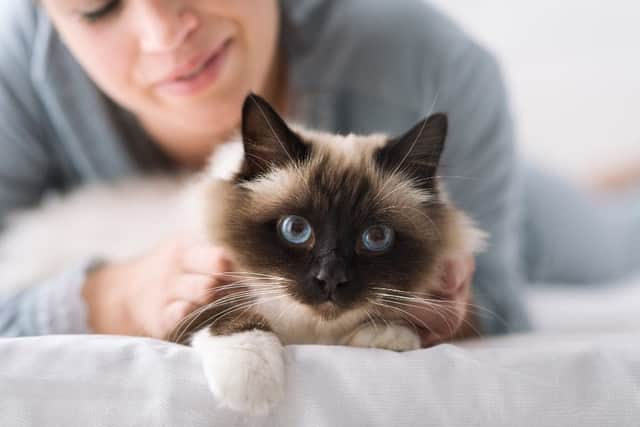Here are some of your cat’s strange behaviours explained - from kneading to eating grass


It’s no surprise that cat owners have been googling questions about cat behaviour recently, after months spent cosying up with feline friends during lockdown.
Cat behaviour is often misunderstood by us humans, which has sadly given them the reputation for being indifferent or aloof.
Advertisement
Hide AdAdvertisement
Hide AdHowever, as every cat owner knows, this isn’t true, and often their strange behaviours are signs that our love for them is very mutual.
So, just in time for International Cat Day on Saturday 8 August, here are some seemingly strange cat behaviours explained by pet food experts Canogan, to help you understand your mysterious kitty a bit better.
Licking
From a young age, a cat’s mother would not only lick them as a way of grooming, but also to show affection.
So when your cat starts to lick you, don’t be alarmed by its rough tongue, as they are simply replicating this behaviour to strengthen their social bond with you and show you their love.
Kneading
Advertisement
Hide AdAdvertisement
Hide AdAgain, this is another habit which stems from kittenhood, but one that often gets cats into trouble with owners with expensive upholstery, who don't fully understand them.
When cats are very young, they will knead their mothers’ stomach to stimulate milk flow from her teats.
When a cat is grown, they will continue this behaviour whenever they are feeling happy and comfortable.
You have probably noticed that cats tend to knead a soft item such as a cushion, or perhaps your lap. This should be taken as a compliment, that your cat feels comfortable around you.
Drooling
Advertisement
Hide AdAdvertisement
Hide AdDrooling is often only associated with dogs. However, many cat owners will attest that it’s actually quite normal for cats too.So if you find your kitty drooling like they're dreaming of their favourite food, it is actually a sign that you have done a good job of making them feel safe, relaxed and content.
Headbutting
While this may seem like a somewhat aggressive behaviour on paper, cat owners know that these soft headbutting actions are far from it. However, some owners are still confused about what it actually means.
Cats have scent glands in their temples and at the corners of their mouths that they use to leave scent marks on objects they wish to claim as theirs, including you. So, these ‘headbumps’ are in fact a bonding exercise, as well as a sign of their trust in you.
Meowing
A grown cat’s meow is specifically their way of communicating with humans. Although when they are kittens meowing is typically done to let their mother know that they need feeding. As they get older, cats usually stop meowing at one another and begin to use it as a tool for communication with their humans.
Advertisement
Hide AdAdvertisement
Hide AdCats meow as a way of saying hello to you, to ask for a stroke or to be played with, to ask for food, or be let outside or back inside.
However it must be noted that in their later years, they could be feeling disorientated and this could be a sign of dementia (also known as Cognitive Dysfunction Syndrome) - a disease which affects roughly half of all cats over 15.
Eating grass
While there is no scientifically proven reason why your pet cat loves occasionally indulging in grass, different studies have suggested some plausible explanations. One reason is that grass contains extra nutrients that your cat needs in its diet, such as folic acid.
This can help the digestive system, aiding the breakdown of non-digestible items for felines (such as fur) helping them to be passed naturally. Another reason could be to alleviate stress or anxiety.
Advertisement
Hide AdAdvertisement
Hide AdSo long as your grass is chemical and pesticide free, it’s perfectly safe to allow your kitty to enjoy it.
Biting
This behaviour is experienced by many cat owners, so don’t take it personally, as it doesn't mean your cat has changed its mind about you.
Most of the time biting is only done lightly and done to show you that they’ve had enough stroking, to let you know you are tickling them in sensitive areas, or to just be playful with you, acting on their natural hunter instinct.
However if your cat bites aggressively, hurting you in the process, this kind of behaviour needs to be taken seriously and addressed immediately and it could be an indication that your cat is in pain or is stressed.
Bringing you ‘gifts’
Advertisement
Hide AdAdvertisement
Hide AdMany cat owners will know the feeling – the dread of seeing a dead ‘treat’ placed by your feet.
This may seem like a gruesome and unsavoury choice of gift to us, but to our cats it's a prized win from their predator instinct.
One reason for these gifts is to strengthen your bond.
However there is another hypothesis which suggests your cat views you almost as another cat, and since it has never seen you hunt for your food, it is concerned for your survival.
So it's grim choice of gift is actually its way of ensuring you have something to eat, as it wants you to stick around for the long term.
Advertisement
Hide AdAdvertisement
Hide AdSo try not to react negatively to the unwanted present and give them a bit of affection as a thank you before removing it from your home.
Behaviours to keep an eye on
While these adorable behaviours brighten up cat owners' days, if you notice any of the above behaviours have suddenly increased in your pet, particularly excessive licking, constant drooling or strange meowing, it’s important to seek veterinary advice as this could be a sign of an underlying health issue.